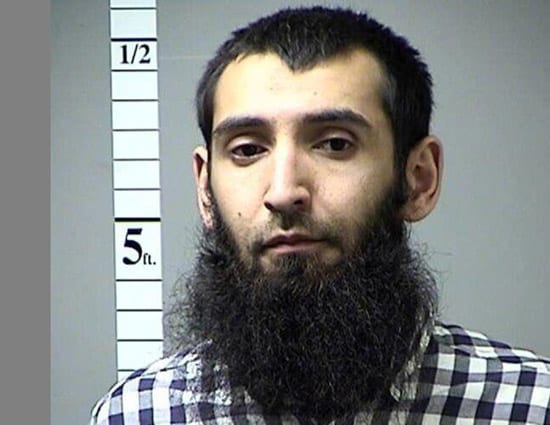New York Attack Underlines Central Asia as Growing Source of Terrorism
Jessica Donati and Paul Sonne, Wall Street Journal, October 31, 2017
Tuesday’s attack in New York has accentuated the growing threat presented by jihadi-inspired terrorism from Central Asia, the onetime Soviet region between Russia and China where little economic opportunity and less political freedom have combined to drive young men toward radicalism.
Officials identified the suspect who allegedly mowed a truck through a Manhattan bike path, killing at least eight people and injuring a dozen others, as Sayfullo Saipov, a 29-year-old man of Uzbek origin.

Sayfullo Saipov
Mr. Saipov, in custody at a local hospital after being shot in the abdomen by a police officer, came to the U.S. in 2010 and is originally from Uzbekistan, officials said. A law-enforcement official said police found handwritten notes near the truck saying that the suspect carried out the attack in the name of the Islamic State extremist group.
{snip}
Uzbekistan has a history of Islamist militancy, centering primarily on the Islamic Movement of Uzbekistan, which has splintered since its founding in the late 1990s, with resulting offshoots allying with the Taliban, al Qaeda and Islamic State.
A 2015 report by the International Crisis Group warned that growing numbers of Central Asians were traveling to the Middle East to support or fight for Islamic State, “prompted in part by political marginalization and bleak economic prospects that characterize their post-Soviet region.”
The report said ethnic Uzbeks were most numerous among the Central Asians fighting with Islamic State. The report estimated that 2,000 to 4,000 Central Asians in total had joined the Sunni Muslim extremist group.
Now, as defeated Islamic State fighters begin to file out of Syria and Iraq, Uzbek nationals pose an added risk in many parts of the world. {snip}
They also have been targeted in counterterrorism operations in the U.S. In 2015 federal prosecutors in New York charged a number of Uzbeks living in Brooklyn for conspiring to join or aid Islamic State. {snip}
Uzbekistan isn’t among the 11 countries targeted by the Trump administration’s immigration policy that focuses on citizens of nations deemed to pose a high risk to U.S. national security and welfare. None of the countries on the list belong to the Central Asian region.
{snip}
In April this year, a 39-year-old Uzbek national drove a truck into a crowd in the Swedish capital of Stockholm, who was known to the police for failing to report for his deportation. {snip}
The same month, Russian authorities identified an ethnic Uzbek citizen of Russia, who was born in Kyrgyzstan, as the perpetrator of a bombing on the St. Petersburg metro that killed at least 14 people. {snip}
{snip}















